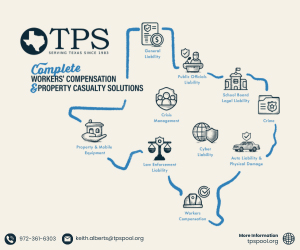What Commissioners Courts Need to Know
Every January following an election year county officials are invited to attend the LBJ School of Public Affairs Seminar for Newly Elected County Judges and Commissioners in Austin. This 20-hour “crash course” on county government immerses attendees into their new office with presentations on responsibilities, statutes, challenges and expectations.
Along with their copious notes and handouts, participants leave Austin with a somewhat dizzying sense of “information overload,” understandable considering the vast responsibilities such as adopting the county budget, which affects each and every county department.
The budget document authorizes county spending, or purchasing. The Texas Public Purchasing Association (TxPPA) calls it “County Procurement” and describes the task as follows:
Procurement is an essential county government business function. Procurement activities, which are expenditures made to the private sector for the purchase of goods and services, result in the second largest expenditure of taxpayers’ dollars. The largest dollars are for personal services that are paid out in the form of employee wages, salaries and benefits.
The integrity and efficiency of the county procurement process is a crucial component of its credibility. More public officials have been criticized for real or perceived conflicts of interest in the spending of public funds than on any other financial activity. Even with the knowledge of such potential criticism, public officials often misunderstand procurement’s significant budgetary and public relations importance.
Even the perception of public officials misusing the procurement process for personal or political gain threatens the public’s confidence in its government. Therefore, the commissioners court, all public officials, and the purchasing agent must ensure a high standard of professional ethics in all personnel who participate in, or who can influence those involved in, making procurement decisions. – Texas County Purchasing Guide (www.txcountypurchasing.org/assoc/export/sites/txppa/downloads/TCPA_County_Purch_Guide.pdf.
Considering these ramifications, what, exactly do commissioners court members need to know when it comes to county purchasing?
County Budget and Purchasing
The obvious connection between the commissioners court and purchasing is the county budget, which authorizes spending for each department in the county.
In addition, if departments wish to spend amounts over the budget, the commissioners court must approve the amendment to the budget before the expenditure can be made, said Narita Holmes, former Ector County purchasing agent.
“There is a great deal of control over purchasing through the budget,” she emphasized.
The court also becomes involved in purchasing when purchases of like items in one fiscal year exceed $50,000 in total. This scenario requires formal sealed bids or proposals which must be solicited and evaluated by the individual charged with administering the purchasing process, and approved for award by the commissioners court, said Holmes, director of audit and compliance for the University of Texas of the Permian Basin. (See Key Concept, page ?.)
In addition, if a contract is the result of the purchasing process, “the commissioners court has exclusive authority to authorize the contract in the name of the county,” she indicated.
Purchasing Statutes
The act of purchasing on behalf of the county is governed by a myriad of statutes, the primary one being the County Purchasing Act as found in Local Government Code Chapter 262. This section of law describes the county’s purchasing and contract authority and the appointment of purchasing agents and their authority.
“Chapter 262 gives specific instructions for making purchases,” Holmes noted. Other key statutes include:
ü Local Government Code Chapter 271, subchapters B and D, which includes laws related to competitive bidding on public works contracts and authorization to participate in awarded state cooperative bids;
ü Local Government Code Chapter 791 relating to cooperative bids, authorizing county purchases through properly established cooperatives; and
ü Local Government Code Chapter 2267, a newly established section of the law which became effective Sept. 1. This chapter includes alternative methods of acquiring construction services. The law related to counties was previously included in Local Government Code Chapter 271. When 2267 was established, the wording was also changed.
“Care should be taken to be certain that specifications for construction and infrastructure projects comply with the new wording of this law,” Holmes maintained.
Purchasing Agents
A key responsibility of purchasing agents is studying the purchasing law and keeping track of legislative changes.
While counties are not required to appoint purchasing agents, “many counties have found that having a purchasing agent helps ensure compliance with the many areas of state law related to purchasing,” Holmes stated. Chapter 262 of the Local Government Code delineates how purchasing agents are appointed.
In counties that do not have an appointed purchasing agent, the county auditor is responsible for purchases, although the county “must have a careful segregation of duties between purchasing and accounts payable,” Holmes emphasized. “Smaller counties sometimes administer formal bids through the county judge’s office.”
Most medium-to-large counties have an independent purchasing agent who, along with the county auditor, “ensures a check-and-balance control system for expending taxpayer dollars,” said Cyd Grimes, Travis County purchasing agent.
The commissioners court and the purchasing agent have a dual relationship, according to Grimes. First, when it comes to service, the purchasing agent makes certain that the court and all other elected officials “have the goods and services to successfully perform their missions,” Grimes declared. And, statutorily speaking, the purchasing agent “supervises the court’s contracting authority under the Purchasing Act.”
As part of this relationship, the commissioners court relies on the agent to keep the county in compliance. For example, Grimes will verify that documents are changed to incorporate the new wording required by the 82nd Legislature relating to alternative construction procurement methods.
Grimes encouraged commissioners courts to not only rely on their agents for compliance, but to also trust “their experience and expertise.”
The relationship between the purchasing agent and the commissioners court involves continual communication, Holmes underscored. For example:
v During the budget process, the purchasing agent can verify the costs included in departmental budgets for items ranging from office supplies to equipment and services.
v When purchasing occurs after a budget is approved and a formal bid or proposal is required, the purchasing agent will often have the commissioners court approve the specifications prior to issuing them to vendors.
v When the bids or proposals have been opened and tabulated, the agent may meet individually with commissioners court members to discuss the items on the agenda for award.
v Occasionally, a member of the commissioners court will serve on the evaluation committee for sealed proposals, and may also be appointed by the court to participate in negotiations with the awarded vendor in development of a contract that will go to the court for award.
v The purchasing agent takes proposed policies and procedures to the court for approval, including procedures for purchases that do not reach the $50,000 formal bid or proposal limit.
Common Pitfalls to Avoid
County judges and commissioners are involved in the awarding of bids and proposals, meaning they need to be aware of the related requirements.
The awarding of bids and proposals should always be made based on the specifications provided to vendors, Holmes asserted.
“If an award is based on something not included in the specifications, it may result in legal liability on the part of the county,” she explained. “It is always best to cancel a bid or proposal, rewrite specifications, and restart the process if it appears that a major change is needed in the specifications in order to obtain the products or services required.” If the changes desired are minor, it is possible that an addendum may be issued to adjust the specifications, she added.
“All vendors should always be provided the same information in order to keep a “level playing field,” Holmes stressed.
Another mistake to avoid is allowing information related to a sealed proposal to be released to vendors prior to completion of the purchasing process.
“Confidentiality allows the county to clarify issues in the initial proposals, request final and best offers, and negotiate with the vendor providing the best value to the county based on the evaluation criteria and relative weights included in the specifications,” Holmes detailed. If proposal information is divulged prior to completion of the process, it may cause additional expense for the county.
Violations of the County Purchasing Act
Any person – including purchasing agents or county officials – who knowingly violates or authorizes the violation of the Purchasing Act commits a criminal offense which is a misdemeanor. Each act in violation of the law is a separate offense, according to the TxPPA.
The following purchasing strategies that are made with the intention of avoiding formal competitive bidding are in violation of the law:
● COMPONENT PURCHASES: purchasing a series of component parts of an item that normally would be purchased as a whole;
● SEPARATE PURCHASES: purchasing goods and services in a series of separate purchases that in normal purchasing practices would have been purchased in one purchase; and
● SEQUENTIAL PURCHASES: purchases made over a period of time that in normal purchasing practices would be made as one purchase.
A final conviction of a county officer or employee for this violation results in the immediate removal from office or employment of that person. For four years after the date of the final conviction, the removed officer or employee is ineligible:
1. to be a candidate for or to be appointed or elected to a public office in this state;
2. to be employed by the county with which the person served when the offense occurred; and
3. to receive any compensation through a contract with that county.
In addition, any commitment to acquire goods or services without an authorized purchase order is prohibited, and anyone obligating an expenditure of funds for goods or services prior to securing a purchase order may be held personally responsible for the payment.
For a comprehensive listing of all purchasing-related statutes, go to www.txcountypurchasing.org/assoc/export/sites/txppa/downloads/TCPA_County_Purch_Guide.pdf and see the section titled County Procurement Laws.
How Smart Purchasing Benefits the County
Wise purchasing means legal purchasing, keeping the county, the commissioners court, and county employees above reproach. The TxPPA puts it like this:
“Most importantly, the integrity of the procurement process must be enforced to maintain the public's trust and reduce the government’s exposure to criticism and suit. This goal is achieved by complying with all applicable legal provisions.”
In addition, “smart purchasing saves taxpayers money,” Grimes emphasized, “ensuring the best value for taxpayers.”
Consolidation of purchasing in one office allows consolidation of like purchases, which should result in lower costs and more efficient purchasing, Holmes suggested. For example, “use of cooperatives as a tool in determining the best prices for products and services is another ‘smart’ purchasing technique,” she indicated (see related article, page ?). “A purchasing professional will be aware of these opportunities and be able to determine the best avenue for each purchase.” H – By Julie Anderson
Editor’s Note: The Texas County Purchasing Guide is available at www.txcountypurchasing.org/assoc/export/sites/txppa/downloads/TCPA_County_Purch_Guide.pdf. The Texas Public Purchasing Association, which is comprised of purchasing professionals from state and local entities throughout Texas, provides access to the Texas County Purchasing Guide which was developed by a predecessor organization, the Texas County Purchasing Association.
















